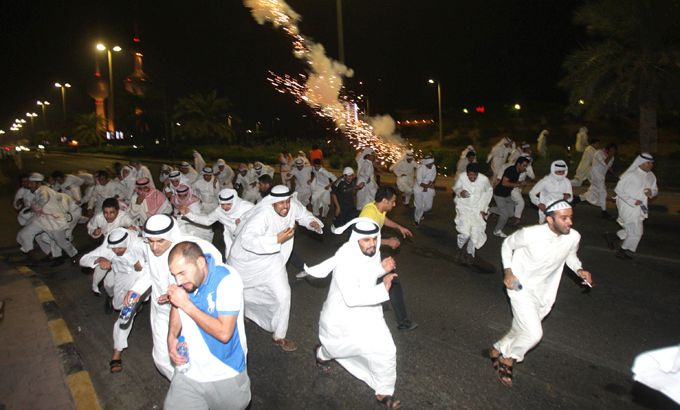Kuwaitis protest electoral law changes
Police use teargas and batons to disperse thousands protesting against changes to the electoral law.

Police in Kuwait have used teargas, stun grenades and baton charges to disperse tens of thousands of demonstrators protesting against changes to the electoral law, which the opposition has called a “constitutional coup” by the government.
Protesters gathered in various parts of the capital, Kuwait City, on Sunday to march towards the government’s headquarters, but riot police swiftly surrounded some groups and used teargas and stun grenades to disperse them, witnesses said.
The opposition decided to take to the streets after the government – which is dominated by the ruling al-Sabah family – announced last week it was calling elections for December 1 and would change the electoral law.
The opposition called for a boycott of the poll, which follows the dissolution of the parliament elected earlier this year in which it had held a majority.
The announcement was the latest move in an intensifying power struggle between the ruling establishment and parliament that has seen eight governments come and go since the emir, Sheikh Sabah al-Ahmad al-Sabah, came to power in 2006.
Policemen wounded
The interior ministry said in a statement that 11 policemen were wounded after protesters threw rocks at them, adding that police only acted after protesters became violent.
The ministry said groups of demonstrators had gathered despite its warnings that marches were banned by law. It said protesters had attacked security forces with stones.
A number of demonstrators had been arrested, the ministry said in the statement reported by the official Kuwait News Agency (KUNA).
An Al Jazeera reporter in Kuwait said streets were quiet on Monday, with life going on as usual.
 |
| Protesters gathered near the iconic Kuwait Towers [Reuters] |
The December snap polls are the second this year and the fifth since mid-2006 as parliament has repeatedly been dissolved.
The opposition said the changes – which allow voters to choose only one candidate per electoral district – would prevent its candidates from winning the majority they won in the last vote.
Forging an electoral alliance, which depends on supporters of one candidate voting for another in exchange for reciprocal support, would become unfeasible under the new system, they say.
Kuwait has the most politically empowered parliament in the Gulf with opposition legislators often directly challenging government officials over alleged corruption and power abuses..